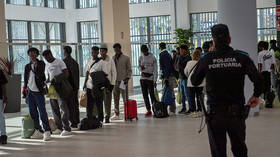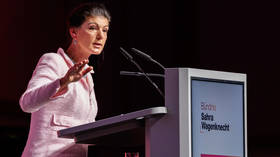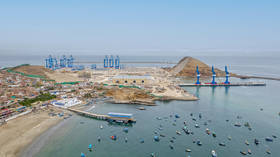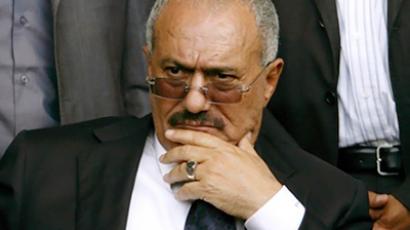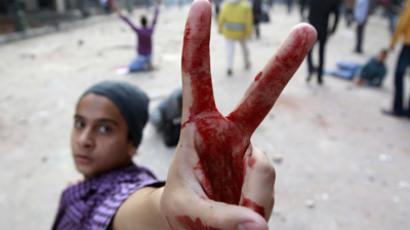Arab monarchies: Muslim Brotherhood 'source of all problems in Islamic world'
The rulers of several major Arab nations have accused the Muslim Brotherhood of ambitions to seize power illegitimately. Several governments branded the organization a major threat to stability as the party’s influence grows steadily.
After the Muslim Brotherhood legally took power in Egypt’s elections, with Brotherhood member Mohamed Morsi becoming President, several Arab Gulf states expressed concern. Monarchies that narrowly escaped the Arab Spring were taken aback when a popular Islamist party suddenly became a key player in the region.United Arab Emirate Foreign Minister Sheikh Abdullah urged Gulf states to deal with an alleged Muslim Brotherhood plot to undermine regional governments. "The Muslim Brotherhood does not believe in the nation-state. It does not believe in the sovereignty of the state," Sheikh Abdullah bin Zayed al-Nahayan said at a press conference.The Brotherhood is banned in the United Arab Emirates, and Abdullah claimed his country’s security forces had arrested some 60 people this year belonging to the local group Al Islah (‘Reform and Social Guidance Association’), a nonviolent political association advocating greater adherence to Islamic precepts.The Sheikh claimed that Islamists – some of whom are connected with the Muslim Brotherhood – were planning to stage a coup in the UAE.Al Islah shares a similar ideology with Egypt’s Muslim Brotherhood, though it does not have direct links to the organization. The group claimed that it only supports nonviolent reform.The accusation came the same day Kuwaiti lawmaker Saleh al-Mulla said that the Muslim Brotherhood is putting pressure on his country’s rulers by taking part in demonstrations “after losing their typical alliance with the government.”Earlier, Saudi Arabian Interior Minister Prince Ahmed bin Abdulaziz denounced the Brotherhood, saying the organization is guilty of “betrayal of pledges and ingratitude” and is “the source of all problems in the Islamic world,” the Washington Post reported.That followed Dubai's outspoken police chief Dhahi Khalfan’s claim in July that the Brotherhood was carting out an "international plot" against Gulf Arab states.The UAE Foreign Minister’s statement came one day after thousands took to the streets of Jordan's capital of Amman over King Abdullah II’s decision to dissolve the country’s parliament. The move was seen as an attempt to compromise with the country’s Muslim Brotherhood branch, Jordan’s main opposition party. The Jordanian wing of the Brotherhood urged the country’s leadership to undertake reforms that would result in the monarchy losing political power. Abdullah II conceded, allowing changes to the procedure by which the country forms a government, with more privileges granted to the electoral winners. The Brotherhood criticized the move as insufficient, and called on their supporters to protest.Egypt – where the Muslim Brotherhood took power after the ouster of Hosni Mubarak last year – sought to reassure Gulf Arab states that it will not push for political change outside of the country. President Morsi said that the country has no desire to "export the revolution."Most Arab Gulf states are hereditary monarchies with limited political representation, with only Bahrain and Kuwait having popularly elected legislatures. Their main sources of revenue come from oil and gas exports, which exist in abundance in their territory. Strong social welfare systems have largely shielded the monarchies from the Arab Spring unrest that has ousted rulers in other majority Muslim countries.“The Muslim Brotherhood's primary goals have been expressed through welfare programs, and it’s a reason for its continuing popularity in places like Egypt, Jordan, Syria,” author and journalist Eric Margolis told RT.The Arab Spring revolutions, most of which started as political rather than economic protests, demonstrated to the Gulf’s monarchic regimes what political Islam can do when it is supported by a mass popular uprising.“Certainly the advent of the Muslim Brotherhood government in Egypt has made people nervous there,” Margolis said. In his opinion, the Brotherhood is little threat to the status quo in the Gulf, since the organization became very conservative over its long history.The bloody civil war in Libya and overthrow of longtime dictator Muammar Gaddafi served as an example to the Gulf monarchies that sponsored the uprising, who now see that “terrorist activity has drastically increased after the Gaddafi regime was removed by terrorist groups,” Ekaterina Kuznetsova of the Center for Post-Industrial Studies told RT.“This is often the case with totalitarian regimes and the vacuum that remains after they’ve been eliminated,” Kuznetsova said.Egypt’s new constitution – drafted by the Islamists who now dominate the parliamentary assembly – is expected to be finished in November.However, the current draft does not meet basic human rights standards, Human Rights Watch said on Monday. The key problem areas mentioned by the New York-based group are the lack of full bans on torture, the trafficking of women and children and discrimination on the grounds of sex.





